
-07-07-2024-
Fourteenth Sunday in Ordinary Time
Gospel Reading: Mark 6:1-6
vs.1 Jesus went to his home town and his disciples accompanied him.
v s.2 With the coming of the sabbath he began teaching in the synagogue and most of them were astonished when they heard him. They said,
s.2 With the coming of the sabbath he began teaching in the synagogue and most of them were astonished when they heard him. They said,
“Where did the man get all this? What is this wisdom that has been granted him, and these miracles that are worked through him?
vs.3 This is the carpenter, surely, the son of Mary, the brother of James and Joset and Jude and Simon? His sisters, too, are they not here with us?”
And they would not accept him.
vs.4 And Jesus said to them,
“A prophet is only despised in his own country, among his own relations and in his own house,”
vs.5 and he could work no miracles there, though he cured a few sick people by laying his hands on them.
vs.6 He was amazed at their lack of faith.
*******************************************
We have four commentators available from whom you may wish to choose .
Michel DeVerteuil : a late Holy Spirit Father, director of the Centre of Biblical renewal , Trinidad W.I.
Thomas O’Loughlin: Prof of Hist Theology University of Nottingham NG7 2RD
Sean Goan: Studied scripture in Rome, Jerusalem and Chicago
Donal Neary SJ: Editor of The Sacred Heart Messenger and National Director of The Apostlship of Prayer.
****************************************
Michel DeVerteuil
Lectio Divina with the Sunday Gospels
www.columba.ie
Textual Comments
The gospel passage for this Sunday is St Mark’s version of Jesus’ return to his home town of Nazareth, accompanied by his disciples. He began to teach in Nazareth, and many were astonished by what they saw in him. They wondered where all this wisdom had come from. What they saw was very different from what others had seen. This man was one of them, in the deepest sense; they knew him and his family. The people of the town would not accept him; even though they had heard of his outstanding accomplishments in other places, they could not see what made him so special.
The story of what happened to Jesus when he decided to return to his town is a familiar story, one that happens to all of us: we achieve wonderful things far away from home – in another city, or perhaps in some other part of the world, where we are not well known; then the time comes when we know we must return to our own country and teach there, and we find that people at home do not see us in the same way.
 As you reflect on this passage, you may find yourself identifying with the people who rejected Jesus because he was so well known to them.
As you reflect on this passage, you may find yourself identifying with the people who rejected Jesus because he was so well known to them.
Or you may prefer to identify with Jesus, remembering times when you or others had an experience like his. If you are taking this approach you might like to read it as a necessary journey of “returning to reality”. Feel free, also, to read the story symbolically, taking “going home” to mean the journey to the deepest truth of ourselves.
Prayer Reflection
“The false idealist skips over the real. He skips the mediation of time in order to land full-blown in the ideal, ultimate society where everything is taken care of. He dreams, he does not hope.” …Jacques Ellul
Lord, we remember with gratitude
the time we had a deep experience of conversion and then had to make a journey back to everyday life:
* we made a Life-in-the-Spirit seminar;
* we went to confession after a long time away from the sacraments;
* we attended a meeting of our religious community and returned all fired up.
The time came when, like Jesus,
we had to leave that beautiful place and return home.
Naturally enough, people were astonished when they heard us speak; they asked sarcastically what was this new wisdom that had suddenly been granted us, what miracles did they expect to be worked through us.
We were no different from what we had been before, they told us, and our parents, our brothers and sisters were there to remind us of this.
We were amazed to see that our own enthusiasm was not universally shared.
But today, Lord, we thank you for that experience;
it taught us that we cannot work miracles overnight.
We may feel a lot of enthusiasm within ourselves,
but that does not mean we can get others to see things as we do.
Sometimes we have to be content, as Jesus was, to cure a few sick people by laying our hands on them.
“Humility is the virtue by which, knowing ourselves as we really are, we become lowly in our own eyes.” …St Bernard
Lord, the biggest obstacles to conversion always lie within ourselves.
We don’t like facing up to this, but, like Jesus, we must eventually leave the far away place and come home.
There, as Jesus did, we will hear voices coming from deep inside, and these voices will be questioning us:
– do we really think that miracles can be worked through us?
– are not our parents, our brothers and sisters there to show us
that we are not different from what we were?
A whole part of ourselves rejects this new direction we are taking
and we are amazed at our lack of faith.
But Jes us taught us that a moment of grace is always resisted by our long-standing relationships and within our deeper selves.
us taught us that a moment of grace is always resisted by our long-standing relationships and within our deeper selves.
Lord, help us to make our journey of grace with Jesus, to accept that we cannot work any great miracles on ourselves,
and to be content that we can lay our hands on some wounds and heal them.
“If people regarded me as a Messiah they were living in a fool’s paradise. I have no miracles.” …Nelson Mandela
Lord, our leaders often prefer to play a role in foreign countries where they are more respected than in their own.
So, too, church leaders sometimes enjoy being present in other communities where they are not well known.
Many of us feel more comfortable away from our families or religious communities, among people who only see part of who we are.
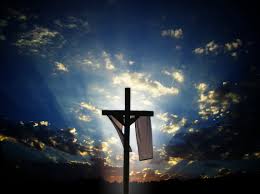 Help us to leave those far away places from time to time, and to go to our home town,
Help us to leave those far away places from time to time, and to go to our home town,
like Jesus did, among our relatives and in our own homes, even though we may feel despised.
We may not be able to work any great miracles, but there are always a few sick people who need us to lay our hands on them so that they may be cured.
“God only comes to those who, in patience, love his fore-runners and the provisional.” ….K. Rahner
Lord, how often you have sent Jesus to us in the form of someone we knew well, but this person was just too ordinary for us.
 All we could see was the carpenter,
All we could see was the carpenter,
the son of our neighbour,
one whose brothers and sisters were there with us, and so we would not accept him.
How true it is, as Jesus said, that a prophet is only despised in his own country, among his own relations and in his own house.
So the great miracle you had in store for us could not be worked.
Lord, have mercy.
We all want to be famous people and the moment we want to be something we are not, we are longer free.” …Krishnamurthi
Lord, we want to do great deeds.
Free us from all ambition, so that when we cannot work miracles
we will be content to cure a few sick people by laying hands on them.
*************************************
Thomas O’Loughlin
Liturgical Resources for the Year of Matthew
www.columba.ie
Introduction to the Celebration
When we assemble each week on Sunday, we are continuing an earlier tradition of God’s people who met on Saturday – the Sabbath. For the Jews, the Sabbath was, and is, the day to rejoice in the goodness of God in creating the universe, and our human family. The first Christians moved the celebration to Sunday as this day was seen as the day of resurrection: God’s great act of restoring and renewing the creation in Jesus.
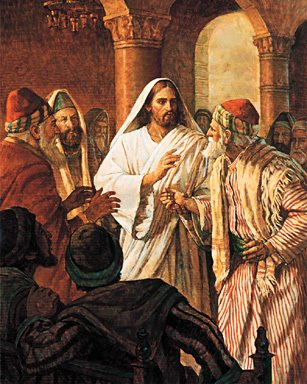 But whether it is celebrating the creation of all by God, or the renewal of all in Christ, the celebrations have some common elements: the people are to recall God’s love in a meal and in reading the scriptures.
But whether it is celebrating the creation of all by God, or the renewal of all in Christ, the celebrations have some common elements: the people are to recall God’s love in a meal and in reading the scriptures.
For the Jews, the meal takes place in their homes on Friday evenings and they gather on Saturday to hear the Law and pray. We listen to the scriptures first, what we call the New Law, and then have our meal together here.
Today we recall that Jesus entered the assembly on the Sabbath in his home town; we believe that he is here among us in this assembly today. Let us recall his presence, and pray that he may find us a community of faith.

Gospel comments
In this short unit of text, Mark summarises several themes that he has already preached in his gospel: the question of discipleship and faith;
Jesus as teacher;
Jesus as miracle worker/healer; and
Jesus as the prophet.
Now his gospel reaches a climactic moment. At the end of all his teaching and miracles in Galilee we have a snapshot of reaction to him: his home town, Nazareth, rejects him. This rejection by his own people in the sense of those he grew up with, those who knew him and his family, presages the greater rejection that comes at the crucifixion.
Underlying the whole scene is the question of what is it to know Jesus and accept him, and this question is framed in terms of faith. They cannot accept this individual as a prophet even if they are amazed at him, and their rejection is seen as unbelief.
Homily notes
1. W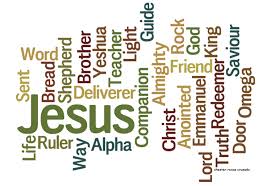 ho are we following when we say we are ‘Christians’? The question seems so obvious that most of us think it a silly question even to ask: it’s obviously ‘Jesus’, isn’t it?
ho are we following when we say we are ‘Christians’? The question seems so obvious that most of us think it a silly question even to ask: it’s obviously ‘Jesus’, isn’t it?
But the question is not silly, nor is the answer obvious, because who Jesus is and what he means to us is far from obvious. Indeed, it is because it is anything but obvious that there have been so many disputes down the centuries among Christians, and there is a whole branch of Christian theology called ‘Christology‘.
 2. Let us begin by noting that most people like ‘to keep it simple’ — and that means they imagine there should be a simple answer to the question ‘who is Jesus?’ — but the reality is that life is complex, and the more any issue involves human beings, the more complex life becomes. Everyone knows that her/his human relationships are complex — how many of us can say ‘I know myself!’ — so why think that understanding Jesus is easy?
2. Let us begin by noting that most people like ‘to keep it simple’ — and that means they imagine there should be a simple answer to the question ‘who is Jesus?’ — but the reality is that life is complex, and the more any issue involves human beings, the more complex life becomes. Everyone knows that her/his human relationships are complex — how many of us can say ‘I know myself!’ — so why think that understanding Jesus is easy?
3. The situation recorded in today’s gospel shows a reaction that must have been widespread: the local people have Jesus in one box in their imaginations:
he is the guy from down the road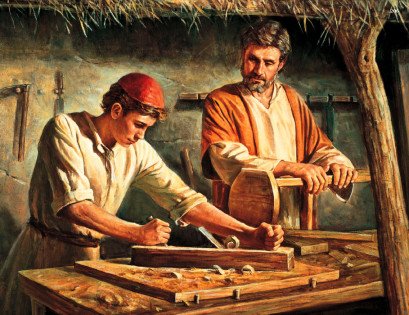 —they know him, his brothers and sisters, and his background. For anyone who comes from their town they have a box for what they expect for and from that person:
—they know him, his brothers and sisters, and his background. For anyone who comes from their town they have a box for what they expect for and from that person:
*fine to get him to do a job for you,
*fine to go to the well with his sisters,
*fine to engage with them socially.
That’s all there is to them: another family, just like us, and they should not think of themselves as anything special. So if Jesus stands up and presents himself as a leader, that is just not on!
On the other hand, they have heard him in the synagogue: he comes across as one filled with wisdom, he is a teacher like they have heard, he speaks in a way they have always imagined a prophet would speak. They have another box marked ‘prophet‘ and he seems to fit there too! But that box comes with a label: prophets are very distant from everyday life, they are exceptional in every way, they are ‘not like us’.
So when these people find that Jesus ticking both the box marked ‘prophet’ and ticking the box marked ‘ordinary bloke’ / ‘regular guy’ /’one of our own,’ they cannot cope with this complexity. So, since they are more sure that he is the guy down the road, they reject him as a prophet.
4. Faith is the ability to imagine that God’s goodness is greater and closer than the bits-and-pieces around us and the ups-and-downs of life. In this case, faith was the ability to imagine that God was so close that Jesus was both the guy from down the road and the great prophet and the wise teacher and more besides. But the group could not make that leap of imagination —and Jesus was amazed at their lack of faith.
5. Would we have been among that group that could not imagine that God’s goodness was that close?
6. Surely not! After all, we are Christians, who publicly declare our faith in Jesus each week in the creed.
7. But we have problems of our own in imagining the goodness of God coming close to us in Jesus.
8. For many people, it is fine to think of Jesus as a wise teacher —a proclaimer of great religious or moral truths — and as such one who should inspire us to high ideals. This is all true, but is there a label on that box which says: ‘Not needed on a day-to-day basis in life’?
***************************************************
Sean Goan
Let the Reader Understand
www.columba.ie
Gospel
This i ncident reports what happened when Jesus returned home to Nazareth for the first time after beginning his public ministry and having much success all around Galilee. It continues to deal with the topic of faith and obstacles to it. As in Luke’s account, the beginning is quite promising. Jesus amazes them by his teaching in the synagogue but their amazement quickly turns to resistance as their supposed knowledge of him convinces them that he could not possibly be anyone special.
ncident reports what happened when Jesus returned home to Nazareth for the first time after beginning his public ministry and having much success all around Galilee. It continues to deal with the topic of faith and obstacles to it. As in Luke’s account, the beginning is quite promising. Jesus amazes them by his teaching in the synagogue but their amazement quickly turns to resistance as their supposed knowledge of him convinces them that he could not possibly be anyone special.
The reference to his brothers is usually understood in the Catholic tradition as meaning his kin or cousins. In Greek Orthodox circles, there is a tradition that Joseph had children by an earlier marriage and these are Jesus’ step brothers. The lack of faith that Jesus encounters leads the evangelist to comment that he could do no miracle there and that he was amazed at their lack of faith.
Reflection
E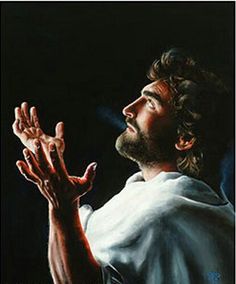 zekiel and Paul both provide us with a valuable lesson in discipleship in these readings. Their work for God brings them into situations that they would not choose for themselves and appears on occasions to meet with failure. However, they have both learned that if they keep their focus on the Lord of the work then they need have no worries about their work for the Lord.
zekiel and Paul both provide us with a valuable lesson in discipleship in these readings. Their work for God brings them into situations that they would not choose for themselves and appears on occasions to meet with failure. However, they have both learned that if they keep their focus on the Lord of the work then they need have no worries about their work for the Lord.
All their experiences can be of service to him if undergone in a spirit of humble faith. Similarly, it is the lack of just such a humble faith that prohibits the spread of the kingdom in Nazareth.
**********************************
Donal Neary SJ
Gospel Reflections
www.messenger.ie/bookshop/
In the Ordinary
It’s easy to think you know people. Then they can surprise you. We can find ourselves making opinions and judgements easily on people on colour, race or age. Or we know them for a long time and then something happens like a marriage or a death and we see another side to them.
We think the same even about Jesus – was Jesus a carpenter? No! He could work in wood, metal or stone! So immediately we are challenged by this gospel like they were. Here was the ordinary man, going every week to work in Sepphoris, a few kms from his home, now taking on the role of preacher and prophet. Nothing divine about that – or maybe it’s one of the most divine things we can do! Work and family bring us close to God who is working all the time and who is loving all the time.
How might you see God today – creation, love, silence, care?  A new baby in the family – God’s creation of new life with us, or someone who is very ill but in weakness of the body is also finding peace in the prospect of heaven….that is God at work. God is around in the depth moments of life.
A new baby in the family – God’s creation of new life with us, or someone who is very ill but in weakness of the body is also finding peace in the prospect of heaven….that is God at work. God is around in the depth moments of life.
What does this gospel make of Jesus? He makes sense of our lives with us and for us, teaching and healing with compassion and love. We do not know him fully, we don’t know all he said, but live by the echo of his words.
Think over yesterday – what gave you a lift in the heart,
a sense of peace, the presence of God.
Lord, I thank you for the wonder of us all!
*********************